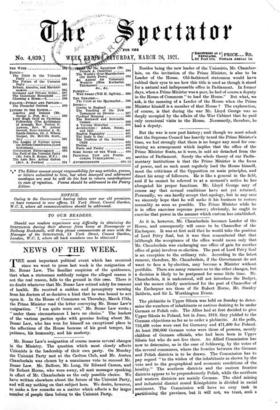Mr. Sonar Law's resignation of course means several changes in
the Ministry. The question which most closely affects Unionists is the leadership of their own party. On Monday the Unionist Party met at the Carlton Club, and Mr. Austen Chamberlain was chosen by a unanimous vote to succeed Mr. Boner Law. Mr. Balfour, Mr. Long, Sir Edward Carson, and Sir Robert Home, who were sway, all sent messages speaking. in effect of Mr. Chamberlain as the only possible choice. We have written elsewhere about the future of the Unionist Party, and will say nothing on that subject here. We desire, however, to make a few remarks on a matter which affects a far larger number of people than belong to the Unionist Party.
Besides being the new leader of the Unionists, Mr. Chamber- lain, on the invitation of the Prime Minister, is also to be Leader of the House. Old-fashioned statesmen would have rubbed their eyes to see how this title is used as though it stood for a natural and indispensable office in Parliament. In former days, when a Prime Minister was a peer, he had of course a deputy in the House of Commons " to lead the House." But what, we ask, is the meaning of a Leader of the House when the Prime Minister himielf is a member of that House ? The explanation, of course, is that during the war Mr. Lloyd George was so deeply occupied by the affairs of the War Cabinet that he paid only occasional visits to the House. Necessarily, therefore, he had a deputy.


































